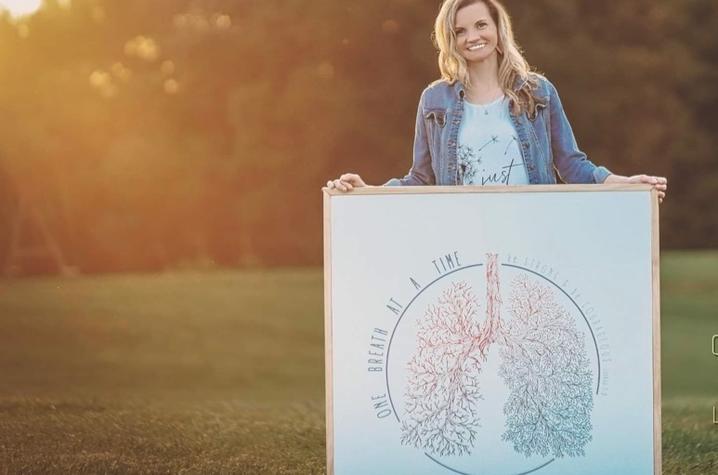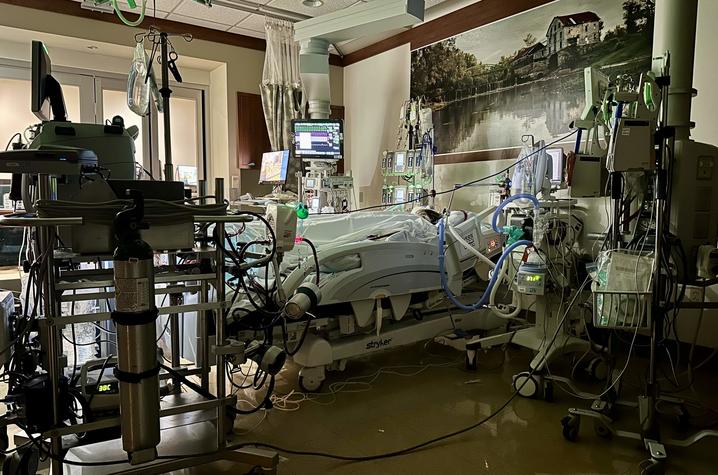From breathless to boundless: New lungs help patient live life to the fullest
LEXINGTON, Ky. (May 13, 2025) – Lyndsey Minch Allnutt couldn’t remember a time when she couldn’t stop coughing or struggling to catch her breath.
Until about two years ago, the 38-year-old mom of three from Owen County relied on oxygen tanks and wheelchairs, struggling to make it from one end of the house to the other. Now she’s running 5K races and half marathons, coaching her daughter’s cheerleading team and making up for lost time with her family.
“It would take me 20 minutes to walk from the school parking lot to the softball field,” Allnutt said. “And now, my kids are trying to keep up with me.”
At the age of 12, Allnutt was diagnosed with bronchiectasis, a chronic condition in which the airways in the lungs widen and become damaged over time. In a healthy lung, any harmful particles that are inhaled become trapped in the mucus produced by the lungs. The mucus can either be coughed out or swallowed, taking the trapped particles out with it.
But with bronchiectasis, the mucus can’t be cleared; bacteria builds up, leading to infection. The infection, in turn, causes further damage to the lungs. The damage is permanent and irreversible, often leading to shortened lifespans due to respiratory failure.
“They told my mom I probably wouldn’t live to see my 21st birthday,” she said.
But she did, only checking in with doctors over the years when she felt unwell. Too many of them weren’t familiar with bronchiectasis and would dismiss her concerns as asthma and send her home with an inhaler.
It wasn’t until the birth of her daughter that Allnutt met a doctor who not only understood bronchiectasis, but convinced her to seek treatment. Her daughter was born premature and struggled with asthma. She took her to see Michael Anstead, M.D., a UK HealthCare pulmonologist who specializes in cystic fibrosis, a disease not too dissimilar from bronchiectasis.
“He asked about family history, and I told him I had bronchiectasis,” Allnutt said. “He said, ‘You need to come see me.’ I went to see him, and it was the best decision I could have ever made.”
The hard conversation
There is no cure for bronchiectasis, just management through medication and breathing treatments. Gradually, Allnutt found herself struggling more and more to breathe. Even walking around the house became a struggle. In August 2021, Anstead said it was time to start thinking about the next steps. One day, in the not-distant future, her lungs would no longer be able to support her.
“We had a hard conversation,” she said. “Dr. Anstead doesn’t sugarcoat stuff. He’ll tell you what’s wrong, but he’s not harsh about it. He said he was going to refer me to the Transplant Center.”
Since 1964, the UK Transplant Center has specialized in the care of patients like Allnutt with end-stage lung disease. Even though she had been living with bronchiectasis for most of her life, transplant was never mentioned as an option. Not long after that first visit, Allnutt, who had to be strong for her family, finally acknowledged the gravity of her situation.
“When you’re a mom, you hide your emotions the best you can from your kids,” she said. “If you’re struggling with something, you don’t want your kids to see.
“I was tired of tests, tired of doctors and being poked and prodded. I was tired of bad news.”
She started to wonder if she could make it through the hard days, if the struggle was going to be worth it. But then she thought about her kids, and all the moments in their lives she wanted to be a part of. Graduations, weddings, grandkids — Allnutt didn’t want to miss a single minute.
“I was in the bath, kind of feeling sorry for myself,” she said. “But then this calm came over me and God was like, ‘Stop this. You’re going to be fine. It’s going to work out. There’s going to hard days, but you’re going to make it.’ After that, I was good. We’re good. Here we go.”
‘Here we go.’
Every few months, Allnutt would undergo testing to determine to what degree her lungs were functioning. Gradually, the six-minute walk test became impossible to complete. In the summer of 2022, she was put on oxygen. Short walks from the school parking lot to sports fields and band concerts felt like marathons. Even then, she thought only of her children.
“My kids were in middle school, and you know how cruel middle school kids can be,” she said. “I thought my kids would be embarrassed — what if somebody said something? But the kids were like, ‘You’re our mom, you’re coming’. The last thing I want to happen is for them to remember mom’s bad days.”
In May 2023, Allnutt was listed for a double-lung transplant. Once a patient is listed, they begin the agonizing waiting game, where every phone call could be the one that changes their life. Days could stretch to weeks or months, feeling hopeful that today is the start of a new life, but also feeling guilty because it meant that someone else’s life would be coming to an end.
All plans are put on hold; patients can’t travel far from home, lest the call come through and they need to get to Lexington as soon as possible. The wait can be maddening, frustrating and excruciating.
Luckily for Allnutt , that wait was less than one day.
“The phone rang, and I just thought it was my coordinator making sure I knew I was listed,” she said. “I’ll never forget when said, ‘We have lungs for you.’ I couldn’t stand up. I couldn’t sit down. All I could say was, ‘Already?’”
She arrived at UK Albert B. Chandler Hospital, after calling every family member from the car. She doesn’t remember much, just going to sleep for the surgery.
“Then I was awake and breathing.”
‘Everything’s okay. We made it.’
When she woke up, following the removal of her trachea tube and oxygen canula, she saw something she had never seen before. The monitor at her bedside said the oxygen levels in her new lungs was at 100%. Shortly after, she realized she wasn’t coughing anymore. For the first time in as long as she could remember, she could breathe freely and easily.
To make up for lost time, she hit the ground running — literally. After months of pulmonary rehabilitation to build strength and stamina, Allnutt graduated to 5K races. She joined the coaching staff of her daughter’s cheerleading team. A year later, she completed her first half marathon in Nashville in honor of her donor and their family. She hopes one day she can meet them and share with them all she was able to accomplish.
The road to recovery was far from easy. In October 2024, Allnutt developed pneumonia—a serious and potentially life-threatening complication for lung transplant recipients. Her condition deteriorated rapidly, and she was admitted to the intensive care unit, where she was placed on extracorporeal membrane oxygenation (ECMO), a form of life support that temporarily takes over the function of the heart and lungs to allow the body to rest and heal.
At a critical point, Naureen Narula, M.D., transplant pulmonologist at the UK Transplant Center, gathered Allnutt’s family and gently explained that the next 48 hours would be pivotal.
“What happens next,” she said, “is up to Lyndsey.”
Narula emphasized that ECMO is a life-saving technology that provides a bridge through the most severe phases of illness by giving the lungs and heart a chance to recover.
Allnutt remained on ECMO for six days. Her recovery was the result of her extraordinary resilience, the expert care delivered by the ECMO and transplant teams and the dedicated support from hospital staff. As her condition stabilized, she was gradually weaned off ECMO and later discontinued from hemodialysis. Still intubated and unable to speak, Lyndsey found a way to reassure her loved ones. She scribbled a short but powerful message on a whiteboard:
“Everything’s OK. I’m good. We made it.”
Allnutt insists her survival wasn’t hers alone. Her recovery marked a turning point — not just in her health, but in her journey of perseverance and faith.
“When you’ve fought a battle your whole life, you find that peace,” she said. “Because you know — whatever happens — is God’s will.”
One breath at a time
Two years after her transplant, Allnutt has a new mission — to help as many patients like her as possible.
For the rest of their lives, organ transplant recipients must maintain a strict regimen of medications and treatments to keep their bodies from rejecting the new organ. That regimen requiers Semiannual sbloodwork and imaging, along with strict diets, seasonal virus protocol, restrictions on activities and interactions with crowds. The financial aspect of pre- and post-transplant care can be substantial; insurance covers medication and clinic visits, but other necessities such as transportation and supplemental support can be a barrier for patients, particularly those in rural regions far from their transplant center.
Allnutt and her husband, Brad, founded One Breath At A Time, a nonprofit organization to help other patients shoulder the financial burdens that come with the transplant process. Still in its early stages as a grassroots organization, Allnutt hopes to not only raise funds to support fellow patients, but bring them a sense of peace by alleviating the stress associated with the cost of transplants.
“Insurance only covers so much,” Allnutt said. “We want to help people who can’t afford their medication, or need a wheelchair. So we sell t-shirts, accept donations and do whatever we can to raise funds and awareness. If people are struggling with the decision, I want them to hear my story and be a resource for them.”
Allnutt hopes her story can boost not just awareness for her organization, but for everything that transplant patients go through. It’s a hard journey, one that makes you wonder at every turn if it’s going to be worth it. But two years after her transplant, Allnutt finds herself doing something she never thought would be possible — planning a trip to Hawaii with her family.
“My life wouldn’t be what it is if wasn’t for the team at UK and if I didn’t go through with my transplant,” she said. “I want my kids to remember their mom going to their games, and taking them to Hawaii. That’s the main thing now. I just want to continue to make positive memories for my family.”
Click here to listen to the song Allnutt's husband wrote for her.
UK HealthCare is the hospitals and clinics of the University of Kentucky. But it is so much more. It is more than 10,000 dedicated health care professionals committed to providing advanced subspecialty care for the most critically injured and ill patients from the Commonwealth and beyond. It also is the home of the state’s only National Cancer Institute (NCI)-designated Comprehensive Cancer Center, a Level IV Neonatal Intensive Care Unit that cares for the tiniest and sickest newborns and the region’s only Level 1 trauma center.
As an academic research institution, we are continuously pursuing the next generation of cures, treatments, protocols and policies. Our discoveries have the potential to change what’s medically possible within our lifetimes. Our educators and thought leaders are transforming the health care landscape as our six health professions colleges teach the next generation of doctors, nurses, pharmacists and other health care professionals, spreading the highest standards of care. UK HealthCare is the power of advanced medicine committed to creating a healthier Kentucky, now and for generations to come.









